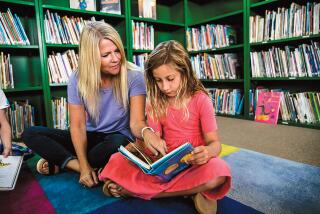Literacy begins at home
In “Bush’s reading program doesn’t pass,” The Times editorial board said that the Reading First program didn’t work the way it was intended.
I doubt if anyone with experience in urban education is surprised at the announcement. We’re disappointed that, once again, a generation of public school kids didn’t get whatever is needed in order to learn to read well.
But we’re not surprised. We’ve been barking up the wrong tree a long time.
The most astonishing literacy-related information I’ve ever seen came out over 10 years ago, in Betty Hart and Todd R. Risley’s “Meaningful Differences in the Everyday Experience of Young American Children.” Their shocking news: There is a huge difference in the number of words and the prohibitive or affirmative tone of words heard by young children depending on whether their parents are on welfare, in the working class or professionals.
They found that by age 3 children of welfare parents heard 10 million words, those with working-class parents heard 20 million words, and those with professional parents heard 30 million words. In addition, with children 13-18 months old in welfare families, almost 80% of the feedback to the child was negative, in working-class families about 50% was negative, and in professional families more than 80% of feedback to the child was affirmative.
It turns out that verbal development is not so much about IQ, parental love or socioeconomic status. These skills are related to how much a child is talked to and the tone of the communications. Literacy is founded on words heard and words used. What this means is that the critical place that literacy develops is the home, not the school, and that the crucial intervention period is very early in the life of a child.
Duh! Families that produce children who read well and achieve in school know this and act on it from birth onward.
Therefore, I contend that the interventions that must be made if we are to improve academic achievement in America need to happen in the home. And young, inexperienced, multi-tasking parents and caregivers need assistance, encouragement and clear information.
Please don’t look at this point of view with disdain and say, “That’s been tried. We’ve tried parental involvement. We can’t reach the parents who really need it.” Parental education has not been tried the way it could be tried. How about an out-and-out, 10-year culture-change effort to assist parents in doing the things that help kids become better readers and learners?
Imagine, for example, how quickly all of us would act if, God forbid, there were a water-borne epidemic. Imagine that we needed to let people know to drink only boiled water for the rest of their lives because to do otherwise would cause immediate boils and bleeding. Imagine how quickly everyone would react, how fast momentum would build, how fast boiled-water products would reach the market.
That’s the energy we need around literacy, with school districts and departments of education stepping up to take the lead in involving everyone.
Here are ideas: How about directing some Title I funds to educate and support parents in lower-wage workplaces--big-box stores, fast-food restaurants, factories, hotels, data-processing companies, government offices -- places where many employees are young mothers and fathers. How about enrolling the goodwill of the Salvation Army, Red Cross, United Way and the huge nonprofits that attract lots of volunteers of all classes and education levels, and bring them on board to reach out and encourage parents?
How about harnessing the political campaign troops of all parties, the caring people who make calls to our homes? How about involving the direct sales industry and those who create those recorded sales calls? How about using the public service components of media in all its shapes, sizes and forms -- radio, television, gaming and entertainment, newspapers and magazines?
How about providing workshops, materials and leadership for churches, hospitals, clinics and social welfare offices? How about setting up video-link programs in prisons so that parents in jail could talk and read to their children?
The simplest form of the message we need to get out is this: Parents, grandparents, caregivers, baby sitters, uncles and aunts -- talk kindly to children a lot from birth on, using big words. Listen to them and read aloud to them in whatever language you want to use. And do these no-cost things often.
If the foundation for literacy is laid in the home, then schools can do their job. If foundation is not laid, even heroic amounts of intervention by the school won’t be sufficient.
It’s that straightforward. And yes, we can.
Esther Jantzen is a children’s literacy advocate and writer. She has 25 years of experience in urban school districts.
Blowback is an online forum for full-length responses to our articles, editorials and Op-Eds. Click here to read more about Blowback, or submit your own by e-mailing us at opinionla@latimes.com.
More to Read
A cure for the common opinion
Get thought-provoking perspectives with our weekly newsletter.
You may occasionally receive promotional content from the Los Angeles Times.










